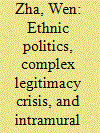| Srl | Item |
| 1 |
ID:
161560


|
|
|
|
|
| Summary/Abstract |
This article examines ethnic conflict and its impacts on intramural relations within the Association of Southeast Asian Nations (ASEAN). It suggests that ethnic politics at home often propels leaders to get involved in ethnic conflict elsewhere. In the ASEAN context, regional institutions, especially the principle of non-interference, mitigate the effects of ethnic politics and preclude the possibility of coercive intervention. The third state is more likely to appeal to facilitation or mediation. On the side of the host state, when the regime faces complex legitimacy crisis, it is more likely to reject the third state's involvement. Ethnic conflict is likely to cause diplomatic tussles between the two states. In contrast, when the regime of the host state enjoys a higher level of legitimacy, it is more amenable to the third party's mediation. Cooperation on conflict management will foster inter-state trust. This article illustrates the above mechanism by examining Malaysia's role in Thailand and the Philippines’ ethnic insurgencies.
|
|
|
|
|
|
|
|
|
|
|
|
|
|
|
|
| 2 |
ID:
087338


|
|
|
|
|
| Publication |
2009.
|
| Summary/Abstract |
The purpose of this review is to identify a framework for understanding the internationalization of ethnic conflict. We examine three approaches that purport to explain escalation-namely extension, interaction, and transformation-and emphasize the fact that each theory by itself lacks full explanatory power. Synthesis that focuses on factors from state and society, which shape the decision to become involved in ethnic strife is essential. Examination of the preceding factors reveals that institutional configurations and ethnic composition indeed do limit future options available to states and influence the distribution of capabilities among leaders of groups. The main conclusion of this essay is that ethnic diversity in a society and high constraint on state action are optimal conditions for overcoming insecurity.
|
|
|
|
|
|
|
|
|
|
|
|
|
|
|
|